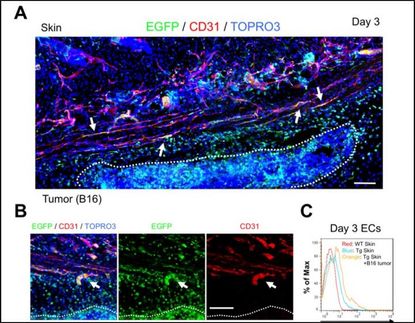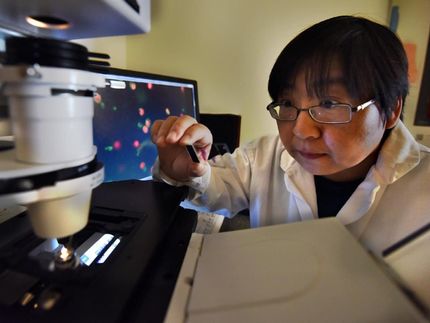ThromboGenics and BioInvent Publicate Data on a Novel Class of Angiogenesis Inhibitors
Novel anti-PlGF antibody, TB-403, being developed by ThromboGenics and BioInvent for
Advertisement
ThromboGenics NV and co-development partner, BioInvent International, announced the publication of data that highlight for the first time the therapeutic potential of anti-PlGF agents to treat cancer based on research performed at the University of Leuven, Belgium and the Flanders Institute for biotechnology (VIB). The data published in Cell shows that antibodies against PlGF (placental growth factor) can inhibit cancer tumour growth and the development of metastases in preclinical models, without affecting healthy tissues. These attractive properties are due to PIGF inhibitors acting by blocking the formation of new blood vessels only in the cancer tissue.
ThromboGenics and BioInvent have made the decision to advance their lead anti-PIGF monoclonal antibody, TB-403, into the clinic, and expect to start the first Phase I clinical trial by the end of 2007.
In particular, preclinical data showed that anti-PlGF antibodies could:
- Inhibit tumour growth and the development occurrence of tumour metastases
- Inhibit tumour growth with a distinct but complementary mechanism to currently available anti-angiogenic therapy
- Not induce resistance because it does not evoke an "angiogenic rescue" by the tumour, in contrast to current angiogenesis inhibitors
- Enhance the sensitivity of tumours to anti-VEGF
- Amplify anti-tumour effect of chemotherapy
- Not cause or aggravate the typical side effects of anti-angiogenic antibodies when given as combination therapy.
Therefore, anti-PlGF antibodies, such as TB-403, potentially have an improved efficacy/toxicity profile that would be expected to inhibit angiogenesis in diseased conditions, without, importantly, affecting normal blood vessels in healthy tissues. According to the companies, these findings pave the way for the development of a new class of improved cancer therapeutics which could have a complementary mechanism of action and potentially enhanced safety profile in comparison to existing angiogenesis inhibitors.
Original publication: Christian Fischer, Bart Jonckx, Massimiliano Mazzone, Serena Zacchigna, Monica Autiero, Emmanuel Chorianopoulos, Marta Koch, Maria Demol, Sabine Wyns, Lucia Pattarini, Nico van Rooijen, Stephane Plaisance, Mauro Giacca, Mieke Dewerchin, Lieve Moons, JeanMarie Stassen, Desire Collen & Peter Carmeliet; "Anti-PlGF inhibits growth of VEGF(R)-inhibitor resistant tumors without affecting healthy vessels"; * Cell 2007.
Other news from the department research and development
Most read news
More news from our other portals
See the theme worlds for related content
Topic world Antibodies
Antibodies are specialized molecules of our immune system that can specifically recognize and neutralize pathogens or foreign substances. Antibody research in biotech and pharma has recognized this natural defense potential and is working intensively to make it therapeutically useful. From monoclonal antibodies used against cancer or autoimmune diseases to antibody-drug conjugates that specifically transport drugs to disease cells - the possibilities are enormous

Topic world Antibodies
Antibodies are specialized molecules of our immune system that can specifically recognize and neutralize pathogens or foreign substances. Antibody research in biotech and pharma has recognized this natural defense potential and is working intensively to make it therapeutically useful. From monoclonal antibodies used against cancer or autoimmune diseases to antibody-drug conjugates that specifically transport drugs to disease cells - the possibilities are enormous




















































